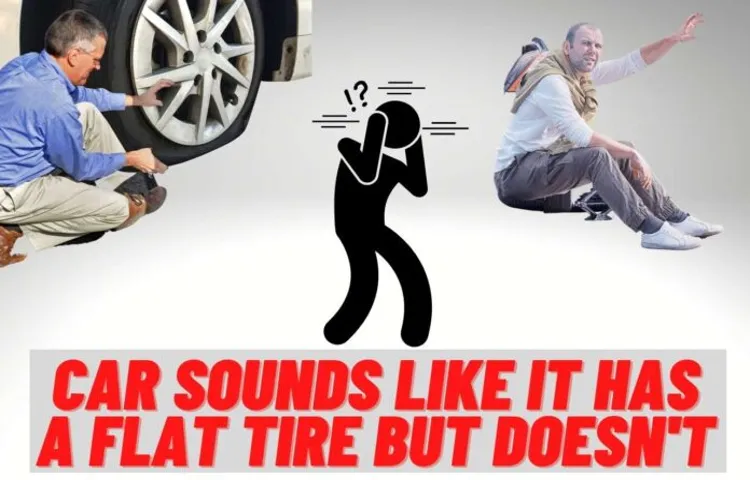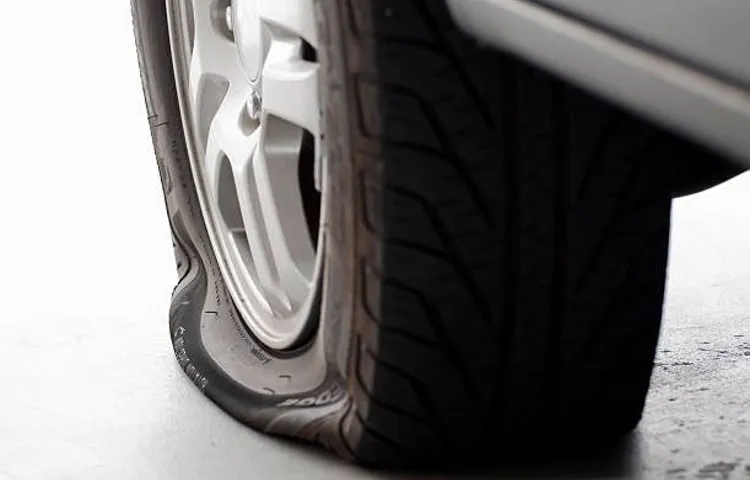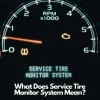Have you ever been driving along, minding your own business, when suddenly you hear a sudden hissing or thumping sound coming from your car? If so, you’re not alone! One of the most common reasons why a car might start to sound like it has a flat tire is due to a puncture or leak in one of the tires. But what if you’ve checked the tires and they seem to be fine? What could be causing that strange, unsettling noise? There are actually several other reasons why your car might be making that sound, ranging from simple and fixable to more complex and expensive. In this blog post, we’ll explore some of the most common causes of this issue, and what you can do to diagnose and solve the problem.
Whether you’re a seasoned driver or a new one, understanding what’s going on under the hood of your car can help you make better decisions about maintenance and repairs, and keep you safe on the road. So buckle up, and let’s take a deep dive into the world of car noises!
Table of Contents
Introduction
Have you noticed that your car sounds like it has a flat tire, even though the tires all seem to be properly inflated? This can be a frustrating and confusing issue, but it’s important to address it as soon as possible. There are a few potential causes behind this strange noise, such as damaged wheel bearings, issues with the suspension system, or problems with the brakes. It’s best to take your car to a trusted mechanic to have them diagnose the issue and make any necessary repairs.
Ignoring the strange noise could lead to further damage to your car and potentially dangerous driving conditions. So, if you’re hearing a strange sound from your car, don’t hesitate to get it checked out to ensure your safety and the longevity of your vehicle.
Common Causes of Tire Noise
Tire noise can be quite frustrating and annoying, affecting not only your driving experience but also the comfort of your passengers. There are several reasons why your tires might be making noise, including uneven wear, low tire pressure, misaligned wheels, and aggressive tread patterns. Tire noise can also be caused by worn-out suspension parts, worn-out bearings, or damaged brake components.
Besides being a nuisance, tire noise could also indicate potential safety issues. It is, therefore, essential to address the cause of tire noise promptly to prevent further damage and ensure your safety while driving. By taking care of your tires and performing regular maintenance, you can minimize the chances of your tires making noise and ensure a comfortable ride for you and your passengers.

Other Potential Culprits
While stress and depression are often the main culprits of fatigue and low energy, they are certainly not the only factors to consider. Other potential culprits can include medical conditions such as hypothyroidism, anemia, and sleep apnea. Hypothyroidism occurs when the thyroid gland is underactive and does not produce enough hormones to regulate metabolism.
Symptoms of hypothyroidism can include fatigue, weight gain, and sensitivity to cold temperatures. Anemia occurs when there is a lack of red blood cells in the body, leading to a lack of oxygen and energy. Sleep apnea, on the other hand, refers to a disorder in which breathing repeatedly stops and starts during sleep, leading to poor sleep quality and daytime fatigue.
With these potential culprits in mind, it is important to seek medical attention if you are experiencing persistent fatigue and low energy levels, as there may be an underlying medical condition that needs to be addressed.
How to Diagnose Tire Noise
If you notice that your car sounds like it has a flat tire, the cause could be due to tire noise. Not all tire noise is the same, and it’s important to understand the different types of sounds to determine what’s causing the issue. The most common type of tire noise is a humming or whirring sound, which is typically caused by uneven wear on the tires or poor wheel alignment.
A clicking or popping sound could indicate a loose or worn wheel bearing, while a squealing noise might be due to low tire pressure or worn brake pads. To diagnose the problem, it’s important to pay attention to when the noise occurs, how loud it is, and where it’s coming from. Checking the tires for wear and tear, and having a mechanic inspect the wheel bearings and brakes can help identify the cause of the noise and ensure that any necessary repairs are made promptly.
Step-by-Step Process
If you’re hearing strange noises coming from your car, it’s important to diagnose the issue quickly before it turns into a major problem. One common culprit could be tire noise, which can be caused by a variety of factors, such as uneven wear, misalignment, or worn out bearings. The first step in diagnosing tire noise is to identify the type of sound you’re hearing.
Is it a high-pitched whine or a low-pitched rumble? Is it constant or does it only occur at certain speeds or during turns? Once you’ve identified the nature of the sound, inspect the tires for any visible signs of wear or damage, such as uneven tread wear or bulges. Finally, take your car to a professional mechanic for a more thorough inspection, as they can determine the exact cause of the noise and recommend the appropriate repairs. By following these steps, you can identify tire noise early on and prevent potential safety hazards and costly repairs down the line.
Common Mistakes to Avoid
When it comes to diagnosing tire noise, there are some common mistakes that people often make that can lead to confusion or misinterpretation of the problem. One of the biggest mistakes is assuming that all tire sounds are the same, when in fact there are different types of noise that can indicate different issues. For example, a high-pitched whine usually indicates worn wheel bearings, while a rhythmic thumping can be a sign of a tire that’s out of balance.
Another common mistake is ignoring tire noise altogether, or assuming that it’s just normal road noise. While some tire noise may be normal, if you’re noticing a change in the sound or an increase in volume, it’s worth investigating to avoid potential safety issues. By listening closely to your vehicle and identifying the specific type of tire noise, you can better diagnose the problem and determine if it’s something that needs to be addressed by a professional.
Prevention and Maintenance
If your car sounds like it has a flat tire, it could be a sign of several issues that need to be addressed. Firstly, if your tires are not properly inflated or have low pressure, they can cause a thumping or rumbling sound which can be mistaken for a flat tire. It’s crucial to check your tire pressure regularly and inflate them as needed.
Another possible cause of the noise could be bad wheel bearings, which can cause a humming sound. This happens when the bearings’ steel ball bearings wear out and start to grind against the metal wheel hubs. A worn-out suspension system can also cause strange noises, such as rattling or knocking noises when driving over bumps or potholes.
This can lead to a bumpy and uncomfortable ride, and in severe cases, it can impact the car’s performance and safety. Regular car maintenance, including routine inspections, checking tire pressure, and replacing worn-out parts, can prevent these problems from happening and ensure your car runs smoothly. Don’t hesitate to take your car to an authorized mechanic as soon as you notice any unusual sound to prevent further damage and keep yourself and your passengers safe on the road.
Proper Tire Maintenance
Proper tire maintenance is crucial to ensure your vehicle runs efficiently and maintains good fuel economy. Prevention and maintenance are key to keeping your tires in top condition. Regularly checking the tire pressure and adjusting it to the manufacturer’s recommended level can prevent excessive wear and tear.
Additionally, rotating your tires every 6,000-8,000 miles can prolong the life of your tires by ensuring even wear. It is also important to visually inspect your tires regularly to check for any cracks, bulges, or foreign objects that may have become embedded in the tread. Addressing any potential issues early on can prevent larger problems down the road.
As with any aspect of vehicle maintenance, being proactive and staying on top of regular maintenance can save you time and money in the long run. So, don’t neglect your tires- make sure they are properly maintained and always road-ready.
Additional Tips for Quiet Driving
When it comes to achieving a quiet drive, prevention and maintenance are essential. One way to prevent excessive noise is to regularly clean and lubricate your vehicle’s components. Keeping your tires properly inflated and balanced can also improve your driving experience and reduce noise.
Another important aspect of maintenance is to address any issues as soon as they arise. A small problem can quickly turn into a larger one, resulting in more noise and potential damage in the long run. By taking preventative measures and maintaining your vehicle, you can significantly reduce the noise levels during your drives.
Remember, it’s easier to prevent issues than to fix them later on.
Conclusion
In conclusion, if your car sounds like it has a flat tire, the first thing you should do is check your tires. However, sometimes the problem may not be flat tires but rather a squeaky suspension, a loose muffler, or even a ghost trying to hitch a ride. So, always remember to stay alert and keep a listening ear to your car’s noises.
Who knows what other mysterious sounds it may make!”
FAQs
What are the common causes of a car sounding like it has a flat tire?
The most common causes are tire issues such as low air pressure, tread wear, or a puncture. Other causes can include problems with the suspension system or brakes.
How can I tell if my car sound is caused by a flat tire or something else?
If the sound becomes louder as you increase your speed, it is likely due to a tire issue. However, if the noise persists even at low speeds, it may be due to something else.
Will driving on a flat tire damage my car?
Yes, driving on a flat tire can cause damage to your car’s rims, suspension system, and even the body of the car. It can also be dangerous to drive on a flat tire at high speeds.
How often should I check my tire pressure to prevent a flat tire sound?
It is recommended to check your tire pressure at least once a month, especially during temperature changes.
Can a misaligned wheel cause my car to make a flat tire sound?
Yes, a misaligned wheel can cause uneven tire wear, leading to a flat tire sound. It’s important to have your wheels aligned regularly to prevent this issue.
How much does it typically cost to fix a flat tire sound?
The cost can vary depending on the cause of the sound and the extent of the damage. It is best to get a professional diagnosis and estimate for repair costs.
How do I prevent a flat tire sound from occurring in the future?
Regular maintenance can help prevent tire issues and other causes of a flat tire sound. This includes checking tire pressure, rotating tires, and getting regular wheel alignments. Additionally, staying aware of road hazards and avoiding rough roads can also help prevent tire damage.



